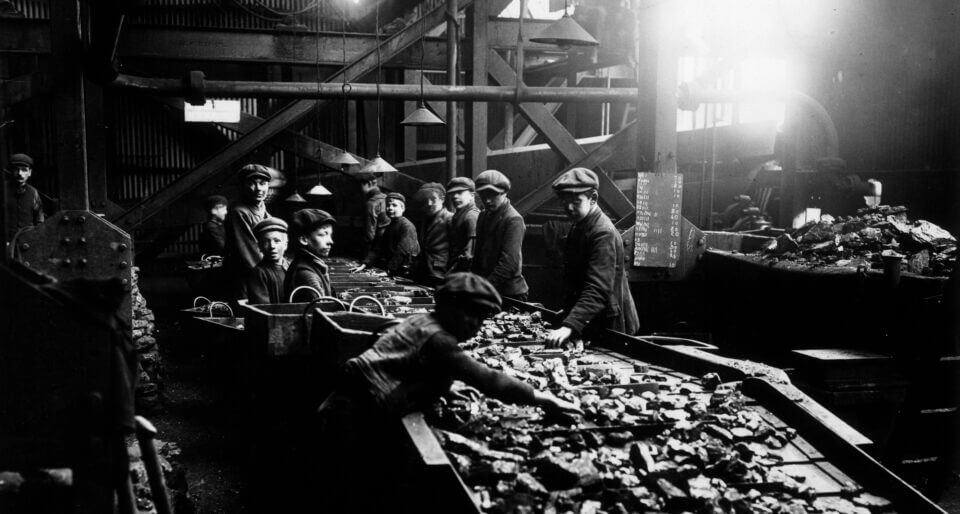
“Leaving behind a bucolic past, the engine of modernity has nature on the run as it speeds towards an uncertain future.”
“Our civilization…is founded on coal,” thus begins George Orwell’s 1937 essay “Down the Mine.” Orwell visited the coal mining districts of England to write a series of essays on the nation’s working class, which would eventually be published as his book—released that same year—The Road to Wigan Pier. Orwell’s descent into the mine was incredibly arduous, as he dropped hundreds of feet vertically and then over a mile horizontally in a cramped dust filled shaft. “[T]he place is like hell,” writes Orwell, “or at any rate like my own mental picture of hell. Most of the things one imagines in hell are there—heat, noise, confusion, darkness, foul air, and, above all, unbearably cramped space.”
Orwell’s drop into the mine in many ways follows a classic mythic descent into the underworld. He enters the more elemental world that underlies the surface world of modern English civilization. As hellish as this underworld is—rather than pitying the miners and their brutal work—Orwell marvels at their strength and toughness:
“It is impossible to watch the ‘fillers’ at work without feeling a pang of envy for their toughness. It is a dreadful job that they do, an almost superhuman job by the standard of an ordinary person.”
All civilizations begin in the earth. Its elements are confronted and transformed by human labor, as well as by the human imagination. A human civilization represents the successful transformation of suffering or, in the words of Nietzsche, “the sublimation of cruelty.” Coal miners, writes Orwell, are the “caryatids” upon which sits all of England’s grandeur and power.
Emerging exhausted from merely visiting the mine, Orwell observes:
“Watching coal-miners at work, you realize momentarily what different universes people inhabit. Down there where coal is dug is a sort of world apart which one can quite easily go through life without ever hearing about. Probably a majority of people would even prefer not to hear about it.”
Orwell also understands the elemental connectedness of the upper world of civilization to the lower mine:
“Yet it is the absolutely necessary counterpart of our world above. Practically everything we do, from eating an ice to crossing the Atlantic, and from baking a loaf to writing a novel, involves the use of coal, directly or indirectly. For all the arts of peace coal is needed; if war breaks out it is needed all the more. In time of revolution the miner must go on working or the revolution must stop, for revolution as much as reaction needs coal.”
In fact, the more successful the civilization, the more its inhabitants are abstracted; thus, the more likely they are to forget where they came from.
All civilizations are grounded in some kind of physical labor. “More than anyone else,” writes Orwell, “the miner can stand as the type of the manual worker, not only because his work is so exaggeratedly awful, but also because it is so vitally necessary and yet so remote from our experience, so invisible, as it were, that we are capable of forgetting it as we forget the blood in our veins.”
All civilization may arise from elemental forces; however, civilizations tend to forget this necessary connectedness. In fact, the more successful the civilization, the more its inhabitants are abstracted; thus, the more likely they are to forget where they came from. And those at the top of a civilizational hierarchy are often the most likely to forget. The tragedy of Shakespeare’s King Lear is that Lear forgets who he is. The egoist, Lear, forgets that his power and authority are entrusted insofar as he is the embodiment of the whole kingdom. “Thou shouldst not have been old” says the Fool to Lear, “till thou hadst been wise.”
Orwell does not simply affirm connectedness with the underworld of the mine; he is humbled by his experience:
“…In a way it is even humiliating to watch coal-miners working. It raises in you a momentary doubt about your own status as an ‘intellectual’ and a superior person generally. For it is brought home to you, at least while you are watching, that it is only because miners sweat their guts out that superior persons can remain superior.”
Towards the end of the essay, Orwell particularly emphasizes that the world of ideas is intimately connected to this dark dangerous world of physical labor:
“You and I and the editor of the Times Lit. Supp., and the poets and the Archbishop of Canterbury and Comrade X, author of Marxism for Infants—all of us really owe the comparative decency of our lives to poor drudges underground, blackened to the eyes, with their throats full of coal dust, driving their shovels forward with arms and belly muscles of steel.”
As he had previously put it, “Their lamp-lit world down there is as necessary to the daylight world above as the root is to the flower.”
Satanic Mills
In J. M. W. Turner’s 1844 painting Rain, Steam and Speed—The Great Western Railway, a fiery locomotive emerges out of the mists and rushes across a bridge towards the viewer. Barely visible ahead of the locomotive runs a rabbit. In the distance below and behind the bridge, a farmer tills the soil. Leaving behind a bucolic past, the engine of modernity has nature on the run as it speeds toward an uncertain future.
Turner’s painting is emblematic of the great civilizational transformations brought about by coal. The artist emphasizes the primal nature of the event by virtually removing the whole front of the locomotive, exposing the fiery coal furnace; it is the fiery power of burning coal that pursues the rabbit and rushes towards the viewer.
As elemental as a coal mine is, it was precisely coal that fueled William Blake’s “dark Satanic Mills” of the Industrial Revolution. Coal is the root that would sustain and nourish an unprecedented bloom of wealth and power. Coal would facilitate not only the transformation of Europe but the conquest of the globe by the great imperial powers of the 19th century. Steam locomotives, steam shovels, and steamships would transform everything. As such, the extraction and burning of coal represents a radically new way of apprehending nature. With the rise of modern science, nature begins to be seen as an object outside of ourselves. To this point, modern science, argues Martin Heidegger, is our way of “revealing” nature:
“The revealing that rules throughout modern technology has the character of a setting-upon, in the sense of a challenging forth. That challenging happens in that the energy concealed in nature is unlocked, what is unlocked is transformed, what is transformed is stored up, what is stored up is, in turn, distributed and what is distributed is switched about ever anew. Unlocking, transforming, storing, distributing, and switching about are ways of revealing.”
Everything in nature—and coal, in particular—becomes “standing reserve,” raw material to be manipulated and exploited. The earth itself loses its once mysterious mythic qualities; it ceases to be a living power and “now reveals itself as a coal mining district, the soil as a mineral deposit.”
While the extraction of coal reflects a new way of looking at nature, the very use of coal, in turn, alters the thinking of those involved in its use. The power of coal, in particular, would give rise to “materialistic” ways of thinking that would ultimately not only forget their origins but deny any necessary dependence upon more elemental reality. We lose a sense of connectedness to nature. So, turning nature into an object has the paradoxical effect of convincing human beings of the essentially subjective nature of experience. The more successfully we objectify nature, the more we think human ideas capable not only of remaking nature as we please but remaking man and society as well. Man, writes Heidegger, “comes to point where he himself will have to be taken as standing-reserve.”
Ideological Frenzy
Driven by the steam of coal powered machines, Europe expands in wealth and power. The population almost triples from 1800 to 1916. Its traditional social forms are stretched and finally tear; Europe bursts into war, and millions perish. But worse horrors were yet to come.
One ideology gives birth to another. The tendency to worship abstractions with little regard to the functioning of the whole crosses all ideological lines and is emblematic of the modern fragmented mind.
In his 2001 book Reflections on a Ravaged Century, historian Robert Conquest writes, “The huge catastrophes of our era have been inflicted by human beings driven by certain thoughts.” What characterizes the great totalitarian movements of the twentieth century, Conquest argues, is an inordinate faith in human ideas to remake reality. Encouraged by the dominance of reason in the 18th century and the power of science in the 19th, “…we get the delusion that our knowledge of human society is so complete that we have the power to reinvent it according to the formulae so obtained, that human affairs are in principle fully understandable and fully manipulatable.”
This is the “ideological frenzy” of Hitler, Stalin, Mao, and many others. But the whole liberal capitalist world originally was also dominated by what Conquest calls “excess ideation” in the form of “an extreme anti-regulatory economic theory.” One ideology gives birth to another. The tendency to worship abstractions with little regard to the functioning of the whole crosses all ideological lines and is emblematic of the modern fragmented mind.
A fixation on ideas tends to dissociate ideas from reality, and they, then, take on a life of their own. George Orwell himself would become one of the 20th century’s great observers of this all too human tendency. No doubt, the profundity of Orwell’s observations were grounded in his own first-hand experiences—not only of coal mines but also of war and ideological derangement. The primal world Orwell describes in “Down the Mine” is, ironically, the source of the power that would destroy traditional societies and ultimately generate the ways of thinking Orwell would become famous for illuminating and satirizing. This is the “Orwellian” world of Newspeak and Doublethink, where all animals are equal but some are more equal than others.
In the 20th century, the burning of coal has largely been replaced by the burning of oil and gas, but the root of power and wealth in the world continues to lie in the combustion of the fossilized remains of creatures millions of years old. And human flowers continue to bloom in unprecedented numbers. Our civilization of phenomenal wealth produces human beings with the luxury to contemplate who they are, as well as their effect upon the world. Our most sensitive flowers—held aloft by long stems of privilege and power—look around; they see not only nature disrupted and polluted but also the suffering and inequality of millions of their fellow human beings. Appalled by the horrors and dangers of fossil fuels, the flowers blink, and they turn towards the sun.
Saved by the Sun
The sun is the origin of all the entrapped energy of fossil fuels. The sun itself is the “root” of all fossil fuels. Science shows us how sunlight can be transformed into relatively clean energy, and, historically, myth shows us how the sun can be understood as the source of all life and all truth. Is then our current fascination with sustainable forms of energy (in general) and with solar energy (in particular) indicative of a return to a more primal and unified understanding of nature? Are we on the verge of a rebirth of the much-anticipated unification of science and myth?
By the late 20th century, the authority of reason and science begins to be systematically questioned, especially in academia. Reason and science are interrogated and exposed as self-serving prejudices that justify the exploitation of nature and the exploitation of other human beings. However, this grand deconstruction project has not resulted in a return to first principle—and not a return to roots, or a return to nature. Quite the contrary, in fact.
The critics of reason and science turn out to be the most extreme manifestations of a world transformed by reason and science. Increasingly enveloped by an objectified reality, evermore subjective human beings emerge until, finally, “the impression comes to prevail,” writes Heidegger, “that everything man encounters exists only insofar as it is his construct. This illusion gives rise in turn to one final delusion: It seems as though man everywhere and always encounters only himself.” Having interrogated everything—having seen through everything—postmodern man fully awakens: Not only can the world be reconstructed by our human ideas; the world is our ideas.
This ultimate transformation of consciousness does not simply see human ideas as capable of manipulating the raw materials of the world into whatever forms we choose. We now insist that ideas themselves are reality, the ultimate reality. It is ideas all the way down. Nature itself is a human construct. The necessity of conflict and suffering in connecting to the earth is a nostalgic illusion, and all hierarchal configurations are self-serving forms of oppression and exploitation. We are all free floating egos with the right to whatever reality we choose. Plato just did not get it; who, after all, is to say what is good or true or beautiful?
Such highly sensitized minds are quite aware of the disruptions and inequities generated by the fossil fuel-based global order. But such minds are themselves ungrounded from experiential reality; they are fragmented, abstracted, and incapable of apprehending the necessary unity of darkness and light, of root and flower. Our ideation has become more excessive than ever.
The fascination with the sun as a source energy is then not a rejection of the abstraction and fragmentation of modern thinking and a return to a more primal and unified understanding of reality. Rather, the fixation on the sun reflects an even more abstract and dissociated way of thinking. The burning of fossil fuels represents pollution, injustice, guilt, and ultimately apocalypse. The sun represents, purity, justice, innocence, and ultimately salvation. The sun does not represent the rootedness of all flowers; rather, the sun has become the ideal of all flowers.
Here we see the new mythologies of environmentalism fuse with a whole social vision. Our historic fossil fuel exploitation of nature is simultaneously the exploitation of man by man. In a world of victims and victimizers, nature itself becomes the ultimate victim. Fossil fuels are the blood of the demon patriarchy; the sun represents salvation from conflict and suffering into an egalitarian utopia of social justice and environmental harmony. Our most sensitive flowers turn towards the sun not as the ultimate symbol of connectedness to nature; rather, the sun is the ultimate symbol of liberation from nature.
So environmental justice is social justice, and social justice is environmental justice. Somehow, the great unjust and unsustainable hierarchies of modern civilization can be leveled by the proliferation of new hierarchies of experts and beneficent bureaucrats. It is all a question of having the right ideas. In a world where thinking has no necessary connection to reality, good intentions and public displays are more than adequate substitutes for reality, and logical incoherence is not necessarily a vice. Such thinking awaits its George Orwell.
Again, Orwell: “Their lamp-lit world down there is as necessary to the daylight world above as the root is to the flower.”
The roots of our civilization penetrate through space and time, and they are as deep and as dark as ever. Indeed, there are no—and never were—human civilizations without roots. Nourished by our roots, millions and millions of flowers bloom, and they bask in the sunshine of their immense power and beneficence. And these flowers aspire to remake the world in their image. But our new flowers have not simply forgotten their connection to the root; they presume to sever themselves from the root and, finally, to cancel the root altogether.
So there will be no coal mines in our new reality; there will be no assaults at all on nature. There will be no unfairness, no hierarchy, no oppression. There will be no suffering. There will be no darkness; there will only be light. There will no longer be a world where ideas are connected to reality, where life is limited, tragic, and civilization fragile. Not only will there be no coal mines, there will be no thinking like coal miners allowed. We will all be flowers in a rootless world where all flowers are equal, and some flowers are the most equal of all.
Chris Augusta is an artist living in Maine.










